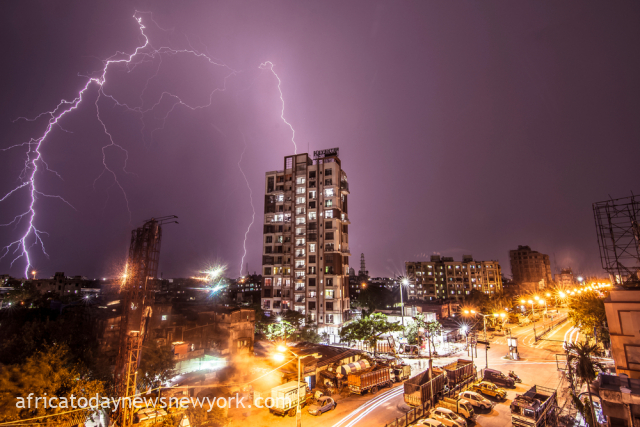Lightning, intense rain, and hailstorms have claimed the lives of at least 24 people in India, according to officials.
Houses were damaged, and livestock perished as the weather wreaked havoc across the western Gujarat state. Meteorologists noted that winter storms are uncommon in Gujarat, making the sudden and intense downpour surprising for many.
Each year, India witnesses the tragic loss of thousands of lives due to flash floods and lightning strikes, with scientists sounding the alarm that escalating global temperatures are contributing to a surge in extreme weather events.
Elevated land and sea surface temperatures heat the air above, providing increased energy to fuel thunderstorms—the origin of lightning.
Western India is likely to experience ongoing rain and hailstorms on Monday, as per the latest weather forecasts.
Officials, in a statement issued late on Sunday, confirmed that at least 18 out of the 24 deaths were directly caused by lightning strikes.
Heavy rainfall, thunderstorms, and hailstorms struck Gujarat state on Sunday and Monday, with certain regions receiving up to 144mm (5.7 inches) of rain in a 24-hour period, according to state government data cited by Reuters news agency.
Read also: Sikh’s Killing: Canada Withdraws 41 Diplomats From India
The head of the Indian Meteorological Department in Ahmedabad, Manorama Mohanty, stated that the collision of three weather systems over Gujarat was responsible for the occurrence of lightning strikes.
‘These are the easterly winds flowing from the Arabian Sea, the Western Disturbance over the Western Himalayas and the Cyclonic Circulation over South Gujarat,’ Ms Mohanty told BBC Gujarati.
India’s Home Minister Amit Shah said he was “deeply saddened” by the deaths, adding that local authorities were engaging in relief work.
Farmer Yogesh Patel, aged 42, tragically lost his life on his farm when lightning struck the tree under which he sought shelter during heavy rainfall.
Mr. Patel is survived by his three children and wife, as confirmed by Shantilal Patel, a close family friend, speaking to the BBC.
‘He was in his farm below a tree when the lightning hit him. When we saw his body, it seemed that the mobile phone in his left pocket of shirt was blasted due to lightning which killed him on the spot,’ she said.
Between 1967 and 2019, official data indicates that lightning strikes were responsible for over 100,000 fatalities in India, comprising more than a third of the total deaths caused by natural hazards in this period.
The country has witnessed a surge in the number of lightning strikes, but reported fatalities have decreased in recent years, signalling improved management of lightning risk by authorities, including the implementation of advanced forecasting and early warning systems.

